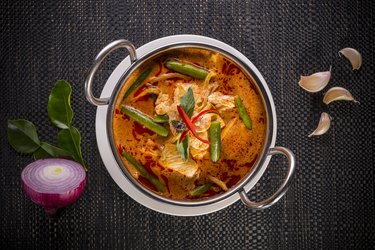
Prior to the 1980s, stomach ulcers were typically blamed on stress or spicy foods — and thus a bland diet was a common treatment. But we now know that ulcers aren't caused by these factors.
Instead, most stomach ulcers are a result of the Helicobacter pylori (H. pylori) bacteria, and some are linked to long-term use of nonsteroidal anti-inflammatory drugs (NSAIDs), such as ibuprofen and aspirin.
Video of the Day
Video of the Day
But that also means there is no specific diet that treats stomach ulcers. However, you may find certain foods worsen or ease your symptoms, and some foods may even help ulcers heal. Talk to your doctor and you can work together on finding the best combination of foods for you.
Stomach Ulcer Symptoms
So how do you know if you have a stomach ulcer? If you have any of the following symptoms, you'll want to check with your doctor.
- Dull, burning stomach pain
- Bloating, burping or a feeling of fullness
- Nausea or vomiting
- Unexplained weight loss or poor appetite
Best Foods for a Stomach Ulcer
While there's no universal diet for treating stomach ulcers, a diet high in fiber appears a good place to start. High-fiber foods can prevent excess stomach acid secretion, which can reduce ulcer pain and protect the stomach lining as the ulcer heals.
Many high-fiber foods are also good sources of polyphenols, plant chemicals that have antioxidant, anti-inflammatory and protective properties that work to improve healing.
High-fiber foods include:
- Raspberries
- Pears
- Apples
- Bananas
- Oranges
- Strawberries
- Figs
- Raisins
- Artichokes
- Green peas
- Broccoli
- Turnip greens
- Brussels sprouts
- Sweet corn
- Potatoes
- Tomato paste
- Carrots
- Barley
- Beans
- Lentils
- Nuts
- Seeds
- Whole-grain oatmeal
- Brown rice
- Whole-wheat bread
Because the H. pylori bacteria causes 70 percent of all stomach ulcers and can sometimes be challenging to eradicate, researchers are trying to understand how foods can help in the treatment of this infection.
A 2014 study from the World Journal of Gastroenterology suggests the healthy bacteria in yogurt and fermented milk products — such as cultured buttermilk and kefir — may increase the effectiveness of antibiotic therapy for H. pylori.
In addition, the components in cranberry juice, green tea, garlic, turmeric, ginger, olive oil, broccoli and many other fruits and vegetables may also enhance standard antibiotic treatment, according to a 2016 study published in the World Journal of Gastrointestinal Pharmacology and Therapeutics. But more research is needed to clearly understand their role in managing stomach ulcers.

Worst Foods for a Stomach Ulcer
If you have a stomach ulcer, you may find that certain foods and beverages cause irritation. Common culprits can include:
- Alcohol
- Coffee
- Other caffeinated beverages
- Spicy foods
However, these items might be well tolerated if consumed in small amounts or with other foods. And it's important to note that these items don't bother everyone with a stomach ulcer. So the best approach is to limit or avoid foods that clearly cause you discomfort and enjoy in moderation those that don't, as there are no blanket restrictions on foods if you have a stomach ulcer.
But less is known about the types of foods that impair healing or make H. pylori infections more difficult to treat — or if restricting certain foods or dietary components will help.
For instance, a 2016 study from Gastroenterology Research and Practice suggests a high-salt environment in the stomach can promote the development of or worsen H. pylori infections. But quality research is not yet available to determine if reducing dietary sodium — or other suspect nutrients — prevents or helps treat H. pylori infections.
Read more: The 10 Worst Foods for Acid Reflux
Beneficial Diets for Stomach Ulcers
While there is no specific diet recommended for stomach ulcers, there are some research-based dietary patterns that provide the beneficial emphasis on fruits, vegetables and other high-fiber foods. Commonly recommended diet patterns include:
- DASH Diet: A plan developed in the Dietary Approaches to Stop Hypertension research trials, this food plan emphasizes fruits and vegetables, suggesting eight to 10 servings daily. The DASH plan also includes whole grains, low-fat or nonfat dairy products, beans, lentils, nuts, fish and poultry and limits oils, sugar-sweetened beverages and desserts.
- Mediterranean Diet: This eating plan also emphasizes fruits, vegetables, beans, lentils, grains, nuts and seeds. It also includes low to moderate amounts of olive oil and wine and limits dairy products, fish and poultry.
- A Whole-Food, Plant-Based Diet: This particular approach to eating is centered on whole, minimally or unprocessed plant foods — such as fruits, vegetables, whole grains, nuts, seeds, lentils and beans — and minimizes or excludes animal-based products like milk, cheese, meat, chicken and fish.
To learn more about an individualized food plan that will help manage your health conditions, ask your doctor for a referral to a dietitian.

Stomach Ulcer Treatment
To effectively treat stomach ulcers, the underlying cause needs to be removed. So if you have a H. pylori infection, your doctor will prescribe antibiotic medications, which may include amoxicillin, tetracycline, clarithromycin or bismuth subsalicylate.
If the cause of your ulcer is related to long-term NSAID use, your doctor will recommend alternative pain relievers like acetaminophen, salsalate or trisalicylate.
Along with these treatments, acid-blocking medicines called proton pump inhibitors (like omeprazole, lansoprazole and esomeprazole) are commonly prescribed to reduce or neutralize stomach acid production and to protect the lining of the stomach as it heals.
When to See a Doctor About a Stomach Ulcer
If you suspect you have a stomach ulcer, see your doctor right away so treatment can begin. Delaying treatment can risk complications, such as perforation and subsequent infection, bleeding or blockage.
Also let your doctor know if your treatment plan isn't working after several weeks, or sooner if your symptoms worsen. Seek urgent medical attention if you have blood in your stools, ongoing vomiting, if you're throwing up blood or food eaten hours or days before or if you feel unusually weak or dizzy.
What Do YOU Think?
Have you ever had a stomach ulcer? Did you see your doctor about it? Did she prescribe you any medication? Did you alter your diet in any way? Did you find that certain foods helped with your symptoms or made them worse in any way? Share your stories, suggestions and questions in the comments below!
- American Academy of Family Physicians: Ulcers
- National Institutes of Health: National Institute of Diabetes and Digestive and Kidney Diseases: Peptic Ulcers (Stomach Ulcers)
- Nutrition Reviews: Health Benefits of Dietary Fiber
- Journal of Pharmacy and BioAllied Sciences: Role of Phenolic Compounds in Peptic Ulcer: An Overview
- World Journal of Gastroenterology: Natural Products and Food Components With Anti-Helicobacter Pylori Activities
- Food and Chemical Toxicology: Antiulcer Properties of Fruits and Vegetables: A Mechanism Based Perspective.
- World Journal of Gastrointestinal Pharmacology and Therapeutics: Non-Pharmacological Treatment of Helicobacter Pylori
- World Journal of Gastroenterology: Efficacy of Fermented Milk and Whey Proteins in Helicobacter Pylori Eradication: A Review
- Gastroenterology Research and Practice: Nutrition and Helicobacter pylori: Host Diet and Nutritional Immunity Influence Bacterial Virulence and Disease Outcome
- American College of Gastroenterology: Peptic Ulcers
- Cochrane Database of Systematic Reviews: Eradication Therapy for Peptic Ulcer Disease in Helicobacter Pylori-Positive People
- Centers for Disease Control and Prevention: History of Ulcers
- National Heart, Blood and Lung Institute: The DASH Diet
- American Heart Association: Mediterranean Diet
- The Permanente Journal: Nutritional Update for Physicians: Plant-Based Diets
Is this an emergency? If you are experiencing serious medical symptoms, please see the National Library of Medicine’s list of signs you need emergency medical attention or call 911.